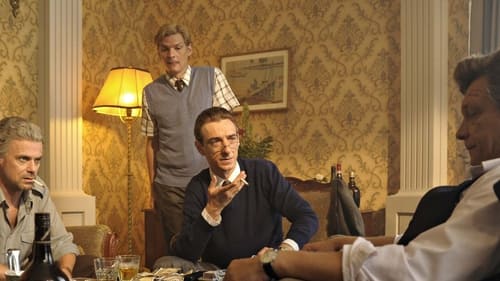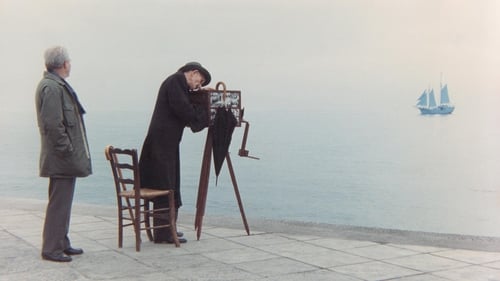
Scenario Writer
The story behind and around famous American director Nicholas Ray's 1960s stay in SFR Yugoslavia. The celebrated director who was the toast of Hollywood only a decade earlier having made Rebel Without a Cause has fallen on hard times and is now desperately trying to re-establish his spiraling film career. On the other hand, his powerful host, Avala Film director and former Yugoslav secret service operative Ratko Dražević, is dreaming big dreams - he is trying to establish a 'Hollywood behind the Iron Curtain' of sorts.

Director
The story behind and around famous American director Nicholas Ray's 1960s stay in SFR Yugoslavia. The celebrated director who was the toast of Hollywood only a decade earlier having made Rebel Without a Cause has fallen on hard times and is now desperately trying to re-establish his spiraling film career. On the other hand, his powerful host, Avala Film director and former Yugoslav secret service operative Ratko Dražević, is dreaming big dreams - he is trying to establish a 'Hollywood behind the Iron Curtain' of sorts.

Writer
Zelimir Zilnik has always been discussing the communist's regime taboos , with his early documentaries , but especially with his film about the student's riots in 1968: Lipanjska gibanja (June Turmoil). His featured film Rani radovi (Early Works) got to trial, because it made important politicians, including Tito himself, very angry. However, it was free of all charges, thanks to the really honorable judge. The Golden Bear, the prime award of the Berlin Film Festival, was given to Zelimir and it was interpreted as the biggest provocation for socialist Yugoslavia. Therefore, the film was put away for years and was not available for the audience.

Director
Zelimir Zilnik has always been discussing the communist's regime taboos , with his early documentaries , but especially with his film about the student's riots in 1968: Lipanjska gibanja (June Turmoil). His featured film Rani radovi (Early Works) got to trial, because it made important politicians, including Tito himself, very angry. However, it was free of all charges, thanks to the really honorable judge. The Golden Bear, the prime award of the Berlin Film Festival, was given to Zelimir and it was interpreted as the biggest provocation for socialist Yugoslavia. Therefore, the film was put away for years and was not available for the audience.

Writer
Through the conversation with Yugoslav film authors and excerpts from their films, this documentary film tells a story of a film phenomenon and censorship, and its focus is, in fact, a painful epoch of Yugoslav film called “a Black Wave”, which was the most important and artistically strongest period of Yugoslav film industry, created in the sixties and buried in the early seventies by means of ideological and political decisions. The film tells a great “thriller” story of the ideological madness which characterised the totalitarian psychology having left multiple consequences felt up to our very days. It stresses similarities between totalitarian regimes defending their taboos on the example of the persecution of the most important Yugoslav film authors. Those film authors have, however, made world careers and inspired many later authors. The film is the beginning of a debt pay-off to the most significant Yugoslav film authors.

Director
Through the conversation with Yugoslav film authors and excerpts from their films, this documentary film tells a story of a film phenomenon and censorship, and its focus is, in fact, a painful epoch of Yugoslav film called “a Black Wave”, which was the most important and artistically strongest period of Yugoslav film industry, created in the sixties and buried in the early seventies by means of ideological and political decisions. The film tells a great “thriller” story of the ideological madness which characterised the totalitarian psychology having left multiple consequences felt up to our very days. It stresses similarities between totalitarian regimes defending their taboos on the example of the persecution of the most important Yugoslav film authors. Those film authors have, however, made world careers and inspired many later authors. The film is the beginning of a debt pay-off to the most significant Yugoslav film authors.

Pacijent
Sonja, once a popular Serbian actress settled in Slovenia is on a short visit to Belgrade. She panics claiming that her daughter Sofia has been kidnapped, then disappears. Inspector Despotovic is assigned to the case and when he finds Sonja, she admits that she made everything up, that she never had a child, and therefore there was no kidnapping. But a Secret Service veteran approaches Despotovic and tells him that the story about kidnapping is true. It is highly classified information. The father of the child is Foreign Affairs Minister. On the other hand, Minister claims that the Secret Service has made everything up trying to compromise him. Despotovic is puzzled... Who is lying? Who is telling the truth? Who is insane? Who is about to die?

Director
Visual artist Rastko Ćirić, professor of Illustration and Animation at the Belgrade Faculty of Applied Arts and horror and science fiction writer Goran Skrobonja, inspired by the titles of songs the Beatles never released, set out to write lyrics and music in the manner in which the Beatles would have done it. They then decided to record the album with their songs. In 1995, the band, named The Rubber Soul Project (in honor of the 30th anniversary of the Beatles Rubber Soul album), was formed.

Director
When the war in Yugoslavia breaks out, an army officer who's ethnic Slovenian yet still believes in Yugoslavia, decides to move to Belgrade. The country continues to fall apart and so does his family failing to find acceptance there.

Assistant Director
"A," a Greek filmmaker living in exile in the United States, returns to his native Ptolemas to attend a special screening of one of his extremely controversial films. But A's real interest lies elsewhere--the mythical reels of the very first film shot by the Manakia brothers, who, at the dawn of the age of cinema, tirelessly criss-crossed the Balkans and, without regard for national and ethnic strife, recorded the region's history and customs. Did these primitive, never-developed images really exist?

Casting
"A," a Greek filmmaker living in exile in the United States, returns to his native Ptolemas to attend a special screening of one of his extremely controversial films. But A's real interest lies elsewhere--the mythical reels of the very first film shot by the Manakia brothers, who, at the dawn of the age of cinema, tirelessly criss-crossed the Balkans and, without regard for national and ethnic strife, recorded the region's history and customs. Did these primitive, never-developed images really exist?

Director
A young man finds a way to spend his last few days of freedom before joining the army. Set in eastern Bosnia in summer of 1968.

Director
A little known cyber punk musical with a love story twist set in a distant future made by Denis & Denis, featuring the most famous songs from their albums "Čuvaj Se" (1984) and "Ja Sam Lažljiva" (1985). This special was broadcast on TV Belgrade in 1985. A song entitled "Ja Sam Lažljiva" features in the end credits. -Jason Forrest, Network Awesome.












